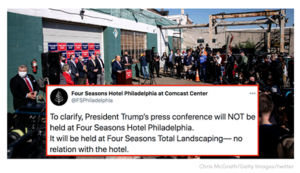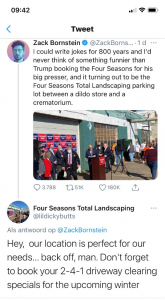The importance of proper trade name protection, (also) as a trademark
Photograph: Chris McGrath/Getty Images/Twitter.
It was a historic weekend; Joe Biden beating President Trump in the U.S. presidential election on November 7, 2020. Of course, an endless amount of Tweets was published. For example, about the fact that at the time the media declared Biden President-elect, Trump appeared to be on the golf course. But the most remarkable story was that Trump’s campaign team had booked the Four Seasons (the famous luxury hotel chain, well known to everyone) for a press conference. Or at least, that’s what they thought.
The Guardian wrote an article about it and the Four Seasons Hotel in Philadelphia posted the following Tweet:

It turned out that the press conference was not booked at the luxurious hotel, but at a landscaping company with the same name – Four Seasons Total Landscaping. That led to confusion and many, many jokes. This location was in fact a parking lot located between a crematorium and a dildo store. Comedian Zack Bornstein, for example, twittered about the countless jokes he could make about this mistake:

Of course, the landscaping company itself reacted as well (see answer Tweet). Apparently, the company did not see any problem in accepting the reservation and receiving Trump’s campaign team for a press conference. The company is on the map at once and is now even selling all kinds of merchandise referring to the event, such as ‘MAKE AMERICA RAKE AGAIN’-stickers and ‘LAWN AND ORDER’-masks.
But how can it be that two companies use exactly the same name? Is that allowed from a legal perspective? Before being able to answer that question, we must first have a closer look at the protection one obtains with the use of a trade name.
Trade name
The trade name is ‘the name used for running a company’. This definition (free translation) comes from the (Dutch) Trade Name Act (Article 1). The right to a trade name therefore arises from the use of that name. Many entrepreneurs and companies mistakenly think that the right to a trade name already arises when the name is registered in the trade register of the Chamber of Commerce. This thought is not that odd, but it is not correct. The mere registration in the trade register does not confer any rights whatsoever. See also this earlier blog post (in Dutch).
Confusion?
It is not in itself forbidden to choose a trade name that is already being used by someone else. But there are limits. Article 5 of the (Dutch) Trade Name Act states:
‘It is forbidden to use a trade name which, prior to the company being run under that name, was already lawfully run by another party, or which deviates only slightly from that party’s trade name, in so far as, in view of the nature of the two companies and the location where they are established, confusion between the companies is deemed to take place at the public.’
Whether the use of a trade name infringes a prior used trade name thus depends on various factors. First of all, it must be checked whether the names are the same/similar, in addition to whether they are used for the same type of activities and, if so, whether the locations in which they are used overlap. If these three questions can be answered with ‘yes’, a fourth requirement must still be met: there must be a risk of confusion.
A risk of confusion is generally assumed if the first three requirements are met, but there are conceivable circumstances in which this is not the case, for example when entirely descriptive trade names are involved. As it stands now (November 2020), in the case of descriptive trade names, additional circumstances are required for concluding that infringement takes place. Whether this will continue to be the case is currently being examined by the Dutch Supreme Court. In any case, it helps in a legal conflict if you can show that there actual confusion takes place in practice. In case, for example, customers ask themselves whether the two companies bearing the same/a similar name are related to each other (indirect confusion) or if they think that one company is the other and vice versa (direct confusion).
In the Four Seasons case, something clearly went wrong and someone made a mistake because of the name.[1] Although both companies are ofcourse not active in the same industry (hotel vs. landscaping company), confusion can still arise because of the name. That will have to do with the fact that the Four Seasons Hotel Resorts is such a well-known name/chain and in fact a well-known brand.
Protection as a trademark
As a company you can rely on your trade name and the rights you build up with it, but that is not always enough. It is difficult to prove that there is a risk of confusion with another company bearing the same name if that company is active in a completely different industry, or in a completely different part of the country. Trade name protection only extends to those areas where a trade name has actually been used.
This is not the case where it concerns trademarks. As a general rule, trademark protection does not arise through use (with a few exceptions), but through the registration of a trademark. A trademark can be registered in certain countries/regions, such as the Benelux or the EU. It does not matter whether you also use your trademark in that entire area. In the first 5 years after registration of the trademark you don’t even have an obligation to use it: after those 5 years have expired, you must use the trademark for the products/services for which you have registered it, at least in part of the claimed area, otherwise you run the risk that your trademark will be declared lapsed. The protection itself extends to the entire area in which the trademark is registered though, despite the use in part of the territory.
With a registered trademark, one can prevent other companies from using an identical or similar trademark, both for the same products/services and for similar products/services. In the case of well-known trademarks, this protection is even broader. On the basis of a trademark with a reputation, the trademark owner will be able to act against identical and similar trademarks for similar and non-similar products or services, if the use takes unfair advantage of or is detrimental to the distinctive character or the reputation of the trademark. There must be a certain degree of similarity between the trademark with a reputation and the trademark under attack so that the relevant public establishes a link. The owner of a well-known trademark therefore enjoys a broader protection than the owner of a ‘regular’ trademark. See my previous blogpost for more information.
So it seems likely that the (well-known) Four Seasons hotel chain will be able to take action against other Four Seasons companies – hotel chains or not – especially if the name is (also) registered as a trademark.
However, companies should not only rely on the protection of a trade name under trade name law only, but also register the name as a trademark. This will lead to a much stronger position in case of a conflict.
[1] Unless, of course, it turns out to be a joke or fake news

In the practical handbooks for entrepreneurs ‘IE in Bedrijf’ (IP in Business) one can read all about brands and infringement, with numerous practical examples. Part 1, IP in Business – Trademarks and trad names and part 6, IP in Business – Infringement of IP rights, handle the infringing use of trademarks and what trademark owners van do against it, but also what options there are to defend yourself against claims. The series is for sale at regular and online bookshops (for example: managementboek.nl) both in hard cover and eBook. For a (free) downloadable copy, please visit IP in Business.

